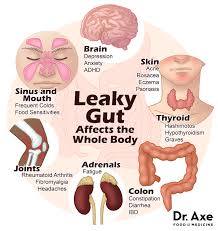|
So you know you have Crohn’s disease. You probably know then that your gut health is the gateway to your own health. If your gut is healthy, chances are that you're in good health. Makes sense, right? Well, there's also a condition called leaky gut that can lead to a host of other health problems. Crohn’s disease may not be the only thing giving you grief. The chronic inflammation of IBD literally eats away at our mucosal protective lining and exposes us to entry into our body of food materials and other foreign particles which enter our lymphatics and blood stream to make every tissue and cell in our body full of toxicity and our liver works overtime to process this toxic load our brain even is poisoned by these toxins. The bad news is when our bowel gets more loaded with these toxins it leaks more. The good news is that it is very reversible. What is a leaky gut? A leaky gut is a gut that leaks. The gut is naturally permeable to very small molecules in order to absorb these vital nutrients. In fact, regulating intestinal permeability is one of the basic functions of the cells that line the intestinal wall. In sensitive people, gluten can cause the gut cells to release zonulin, a protein that can break apart tight junctions in the intestinal lining. Other factors — such as infections, toxins, stress and age — can also cause these tight junctions to break apart. Once these tight junctions get broken apart, you have a leaky gut. When your gut is leaky, things like toxins, microbes, undigested food particles, and more can escape from your intestines and travel throughout your body via your bloodstream. Your immune system marks these "foreign invaders" as pathogens and attacks them. The immune response to these invaders can appear in the form of any of the nine signs you have a leaky gut, which are listed below. What causes leaky gut? The main culprits are foods, infections, and toxins. Gluten is the number one cause of leaky gut. Other inflammatory foods like dairy or toxic foods, such as sugar and excessive alcohol, are suspected as well. The most common infectious causes are candida overgrowth, intestinal parasites, and small intestine bacterial overgrowth (SIBO). Toxins come in the form of medications, steroids, antibiotics, and acid-reducing drugs, and environmental toxins like mercury, pesticides and BPA from plastics. Stress and age also contribute to a leaky gut. Signs and symptoms are completely different e.g. a red face is a sign of leaky gut dysbiosis, but symptoms can be more of a physical feeling. Symptoms can only be described by the person feeling them. If you are having pain, no one knows unless you tell them. It's the same with dizziness, numbness, lightheadedness, fatigue, vision disturbances, ringing in your ears and a whole host of other feelings that anyone not in your body is going to know about unless you describe it. That doesn't mean other people don't notice when you don't feel well. If your face is pale or you are unstable when you walk or you are sweating, then you are showing signs. Signs are just what they sound like: indicators of a problem. They also include breathing rate, heart rate, oxygen saturation, etc. So if you suffer from any of the following symptoms, it’s likely that you have a leaky gut: 1. Digestive issues such as gas, bloating, diarrhoea or irritable bowel syndrome (IBS). 2. Seasonal allergies or asthma. 3. Hormonal imbalances such as PMS or PCOS. 4. Diagnosis of an autoimmune disease such as rheumatoid arthritis, Hashimoto’s thyroiditis, lupus, psoriasis, or celiac disease. 5. Diagnosis of chronic fatigue or fibromyalgia. 6. Mood and mind issues such as depression, anxiety, ADD or ADHD. 7. Skin issues such as acne, rosacea, or eczema. 8. Diagnosis of candida overgrowth. 9. Food allergies or food intolerance. Remember if you have any more questions then please free to email me at [email protected] or visit my Facebook Page at My Crohn's Doctor. Yours in Health and Wellness Dr Michael My Crohn's Doctor www.mycrohnsdoctor.com LEGAL DISCLAIMER - This article (including links to any/all website pages, blog posts, blog comments, forum, videos, audio recordings, etc.) is not intended to replace the services of a physician, nor does it constitute a doctor-patient relationship. Information is provided for informational purposes only and is not a substitute for professional medical advice. You should not use the information for diagnosing or treating a medical or health condition. If you have or suspect you have an urgent medical problem, promptly contact your professional healthcare provider. Any application of the recommendations in this email is at the reader's discretion. My Crohn's Doctor and Dr Michael are not liable for any direct or indirect claim, loss or damage resulting from use of this email. Readers should consult their own physicians concerning the recommendations in this article.
0 Comments
Leave a Reply. |
|




